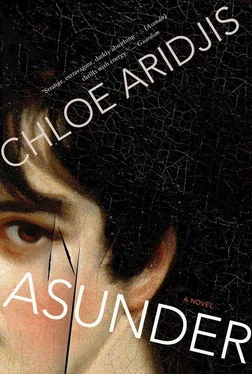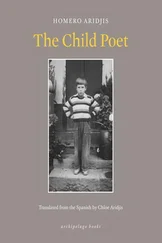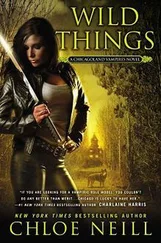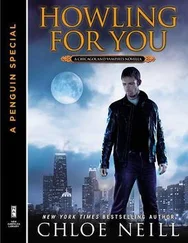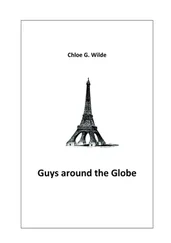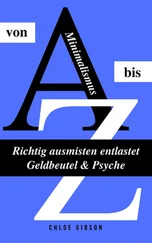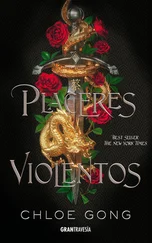The flat smelled as if a dozen cigarettes had been lit, smoked and half put out, the last of them still smouldering in the ashtray. A different kind of cigarette from Pierre’s — the odour suggested filterless and handrolled. Before even seeing him, I knew Lucian had spent the last few nights in our home.
I was still in the corridor with my bags when he emerged from the kitchen, a cigarette between his lips, a mug of tea in each hand. Upon seeing me he bit down on his cigarette and murmured something, arching his eyebrows in surprise. Seconds later Jane appeared in a black lace negligee. At first I thought it was Lucian’s female doppelganger. Her hair had gone from medium brown to a purple black and was so shiny it looked lacquered, as if the shadows from her face — loneliness, disappointment — had risen and receded into her hair. Over the past weeks, I could see, she had transformed herself into one of Lucian’s Goth heroines, Lucretia or Annabel Lee.
‘What happened to your cheek?’ Jane asked the moment she saw me. The line had been turning a darker crimson as it healed.
‘I was scratched by a feral cat.’
She didn’t enquire into which cat or where, yet staying on the subject of fauna began telling me about the insect invasion that had taken place in our flat while I was away, a constant hum and buzz, especially at night.
‘What sort of insects?’
‘Well, mostly moths but also some weird little purplish black ones, I’m not sure what they were.’
‘And what did you do with them?’
‘I put out loads of strips and even swatted a few.’
I looked around.
‘Where are they?’
‘Oh Marie, it was disgusting, the strips looked like bristly unshaven legs, I had to throw them out.’
‘All of them?’
She rubbed her eyes.
‘Yes, I… Come, we’ve just made tea, have some with us.’
I followed her to the kitchen, Lucian doing a U-turn with the mugs.
‘Did you get any painting done?’
‘Only my room and then the paint ran out,’ Jane said, pouring me some tea. ‘Maybe next month we can do the rest of the flat together?’
I reached for the jar of honey. Stuck to the inside wall were two cocoons.
‘So… how was Paris?’
When I entered my room and glanced over at the shelf the landscapes looked old, oxidised, depleted, as if over the past two weeks they’d been drained of their vitality. As I drew closer, I saw that most of the moths on them had disintegrated, the crumbling beige of their wings hardly distinguishable from the crumbling beige of their torsos.
At that moment a fly buzzed into sight and perched on the slope of the mountaintop, crawled a few paces, then moved on to the volcano, where it briefly circled the red crater before flying off.
I picked up an eggshell, the one with the tiny door into night, and held the doorknob between my thumb and forefinger and pulled. For the first time ever it seemed to resist so I pulled harder. All of a sudden the door was in my hand, a rectangular gash out of which night could come spilling out, yet when I peered in I saw only dull black dabbed with spots from a silver metallic marker.
Next I picked up the autumn eggshell and brought it close to the lamp. I could only focus on the clumps of glue that fastened the rough paper leaves to matchsticks. When I turned to the mountain and volcano they too seemed like something pawed at with impatience by a child. They had never appeared so crude, nothing more than coarse dioramas by an amateur, and the more I stood back and stared the more I felt the landscapes vanishing before my eyes.
But maybe all landscapes vanish after a while or one just comes to prefer others. My great-grandfather’s final years were lived out in a cottage at the bottom of a field in Yorkshire. For days on end he wouldn’t exchange a word with anyone; the silence of low ceilings and unclipped hedges was more appealing than any human voice, he said, and his eyes had taken in enough faces to fill three lifetimes.
Only after my trip to Paris could I understand the weariness he once described as he was nearing the end of his time at the Gallery. After forty-six years there who could blame him, but even I, after a mere decade, felt pangs of disenchantment, my feet growing heavy as I climbed the steps to the staff entrance the following Monday. At first I was so indifferent to everything around me I almost forgot to check the plaque to see whether any names had been added while I was away but, needless to say, nothing eventful had taken place in my absence. When I put on my uniform the greyness spilled over my insides too, pressing down on my chest and ribs, cancelling out all colour. My tie kept coming out crooked, as if in two weeks I’d forgotten how to knot it, and I had to ask a colleague for help. At least I was assigned the Sainsbury Wing that day, I would’ve sunk into mortal tedium with the Impressionists, but even the gilt on the medieval panels and paintings refused to shine and not a single saint beamed himself out to distract me. At lunch I had no desire to tell Roland about Paris, though he bombarded me with questions and was more animated than usual, clenching his jaw with a mania I’d never seen before.
All around London the trees remained stripped by winter, their bare branches like bouquets of burnt sparklers. In the sky charcoal clouds hitched rides on strong currents of wind. Strange face-like patterns appeared in the cracked ice of the pavements, rising up from the ground like tombstone rubbings. Things appeared and disappeared, and the scratch on my face had just about healed, now a thin, pinkish line down the length of my cheek.
Daniel, meanwhile, seemed to be flourishing. We had yet to meet up since Paris but had spoken on the phone. From the moment he returned, he’d been gripped by writing fever. He’d walked into his flat, thrown a sheet over the wooden contraption, and sat down by the nautilus shell at his desk. He sent out his poems and wrote more and more new ones. With less patience than usual, I listened on as he told me how for years he’d been inching towards the haiku, circling the form and making small advances, and had now finally started the process, he said, a miniaturisation of existence . But they were urban haikus rather than hymns to nature. Roaches instead of grasshoppers, pigeons instead of swallows, pavements instead of riverbanks, television towers instead of trees. His correspondents had cautioned him from falling into the haiku trap. Few things were more tempting, they knew, than to pare down life and apply X-ray vision to each day, but one had to be careful; the form was deceptively simple.
Two weeks after our trip I was standing in the threshold of Rooms 65 and 66, with just a little more presence in Room 65 since it contained a showcase with one of our very few Dürers, an oil panel on pearwood, St Jerome on one side and on the other a comet, the man in his wilderness and a yellow flash with a red tail bursting out from dark clouds in a night sky, when Daniel appeared. He seemed to have been in a hurry, hair matted to forehead and scarf nearly trailing the floor, but he slowed down once he spotted me, and stopped to catch his breath.
‘Hello.’ I moved towards him. ‘Is everything okay?’
The red of his face retreated slowly, replaced by winter white.
Without answering he removed his gloves, reached into his pocket and pulled out a crumpled newspaper clipping.
‘Thought you might like to see what just arrived in the post, courtesy of Pierre.’
I unfolded what appeared to be an obituary from a French newspaper, dated four days earlier. In the upper left-hand corner was a photograph of a striking man with large eyes and shoulder-length hair. Just as I was starting to see the resemblance, Daniel began to translate, lowering his voice as three new visitors entered the room and came to stand at a painting nearby. Normally I would have asked him to wait until they’d left, but at that moment impatience was burning a path straight through me.
Читать дальше
